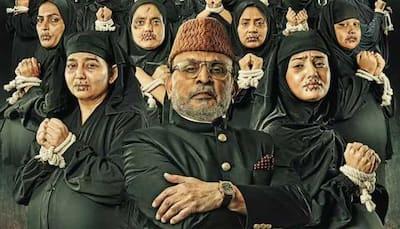
New Delhi: In a significant legal development on Friday, the Supreme Court of India declined to entertain a writ petition that sought the revocation of the Central Board of Film Certification (CBFC) certification granted to the film ‘Hamare Baarah,’ directed by Kamal Chandra and starring Annu Kapoor.
The vacation bench, led by Justice Vikram Nath, articulated that it was not inclined to adjudicate on the merits of the plea submitted directly to the apex court. The petition had contested the CBFC’s decision to certify the film.
“You should challenge the Bombay High Court’s ruling,” Justice Nath remarked. “The movie was screened, and the Bombay judges reviewed it. They directed the removal of a few scenes, shots, and dialogues. If you wish to appeal, it would be more appropriate for this court to examine the matter under such an appeal.” Justice S.V.N. Bhatti, who also sat on the bench, concurred.
Faced with the court’s disinclination to proceed, the petitioner’s counsel opted to withdraw the writ petition. The bench dismissed the plea as withdrawn but granted the petitioner the liberty to file a special leave petition against the Bombay High Court’s order, which permitted the film’s release on June 21 with several modifications.
The Bombay High Court had issued an order on Wednesday, allowing ‘Hamare Baarah’ to be released after mandating certain changes to its content, which had been identified as objectionable. The original petition, filed under Article 32 of the Constitution, asserted that the film depicted Muslim women as lacking independent rights and portrayed the Muslim community as responsible for India’s population growth.
“The film’s director and producers specifically targeted a community, portraying Muslim women as subjugated individuals exploited by male counterparts. Verse 223 of Surah Baqarah, Chapter 2 of the Holy Quran, has been misinterpreted and inaccurately depicted as authorizing Muslim men to treat Muslim women as their property and exploit them in any manner,” asserted the plea, represented by advocate Syed Mehdi Imam.
‘Hamare Baarah,’ directed by Kamal Chandra, features a notable ensemble cast, including Ashwini Kalsekar, Rahul Bagga, Manoj Joshi, Aditi Bhatpahri, Paritosh Tiwari, Parth Samthaan, and Shaan Saxena.
.
The film spurred controversy after a section of Muslim intellectuals viewed its trailer and raised objections. They argued that the movie grossly misrepresents Islam and aims to malign the religion and the Muslim community. The petitioners contended that allowing the film to be released in its original form would propagate harmful stereotypes and misinformation.
Despite these objections, the Bombay High Court’s decision to allow the film’s release—albeit with specific content modifications—indicated a balancing act between upholding artistic freedom and addressing community sensitivities.
While many believe that the film industry should enjoy creative liberties, the sensitivities of various communities cannot be overlooked. This legal tussle highlights the continual struggle between freedom of expression and the perceived need to check potential communal discord.
The CBFC, responsible for sanctioning films for public viewing, had initially issued the certification that endorsed ‘Hamare Baarah’ with modifications. This decision was challenged due to allegations that the movie’s content could incite communal tension.
The legal representative of the petitioners argued that films wield significant influence over public perception. Misrepresentation of religious texts and cultural norms could lead to real-world implications, including perpetuating stereotypes and fueling communal biases. Thus, the plea urged for a revocation of the CBFC certification to prevent the dissemination of what was described as disruptive and inaccurate portrayals.
Directed by Kamal Chandra, the film brings together several renowned actors playing pivotal roles. Ashwini Kalsekar, Rahul Bagga, Manoj Joshi, Aditi Bhatpahri, and others form the core of the cast, contributing to what promises to be a substantial narrative.
It’s worth noting that this isn’t the first time a film faced legal hurdles on these grounds. The Indian judiciary has intervened in film disputes numerous times, balancing constitutional rights with communal harmony.
In summation, the Supreme Court’s decision not to entertain the writ petition reflects judicial prudence in guiding petitioners to channel their grievances through appropriate legal processes. The court’s stance indicates a preference to let lower court decisions stand unless compelling reasons warrant an intervention at the apex level.
As the legal journey of ‘Hamare Baarah’ unfolds, it continues to underscore the ongoing discourse on artistic freedom versus communal sensitivity, a debate that remains ever-relevant in India’s diverse socio-cultural landscape.












